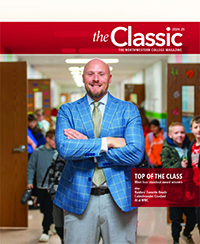Anderson contributes to book on religion in the Pacific region
Tuesday, January 24, 2006
Dr. Douglas Firth Anderson, professor of history at Northwestern College, is one of seven contributors to a new book, Religion and Public Life in the Pacific Region: Fluid Identities, part of a series that examines the religious character of contemporary America, region by region. The Religion by Region series, funded by the Lilly Endowment, includes eight regional volumes and a concluding book that analyzes what the regional variations mean for American religion as a whole. The series is being published by AltaMira Press in cooperation with the Leonard Greenberg Center for the Study of Religion in Public Life at Connecticut’s Trinity College.
Fluid Identities was edited by Dr. Wade Clark Roof, professor of religion and society at the University of California at Santa Barbara, and Dr. Mark Silk, associate professor of religion in public life and founding director of the Greenberg Center.
Anderson wrote “Toward an Established Mysticism: Judeo-Christian Traditions in Post-World War II California and Nevada,” one of the book’s five chapters. He wrote his original draft while on sabbatical in the spring of 2003, and completed major revisions on it last year.
Anderson says the project was a challenge because there aren’t a lot of religious histories of the region. “What religious studies there are tend to be highly focused and don’t try to synthesize and make broad generalizations based on evidence,” he says.
The Northwestern faculty member, who was junior co-author of Pilgrim Progression: The Protestant Experience in California, which was published in 1993 by Fithian Press, says he enjoyed the research he had to do because of that challenge. “It’s like of like putting a jigsaw puzzle together, trying to find relevant examples. It’s easy to talk in vague generalities. I enjoy hunting for something illuminating that will help bring out the themes and developments that seem to be important.”
As a panelist at the American Society of Church History conference in Philadelphia earlier this month, Anderson distinguished between the “solid” Midwest and the “fluid” Pacific region, both politically and religiously. While the Midwest does feature some religious diversity, the Roman Catholic, Lutheran and United Methodist denominations dominate the region, says Anderson. “There’s a certain solidity there that plays itself out politically,” he explains.
The Pacific region’s pluralism, by contrast, could be illustrated by Madonna—whose stage name evokes long-standing Christian associations, but who practices Kabbalah, a Jewish mystical tradition. “Mixing and matching varied religious symbols and traditions is representative of the region’s religious fluidity,” says Anderson. “The Pacific has not only a weak religious affiliation but also a sense of personal entitlement to make choices about belief and practice without making strong commitments to religious traditions or institutions.”
One major aim of the Religion by Region series was to be a thorough resource for journalists who cover religious dimensions of the news. Other audiences include members of the public and scholars interested in learning more about the complexities of contemporary religion and its effect on public life in specific regions.
“This is intended to begin the discussion,” says Anderson. “Hopefully it’s good scholarship that’s accessible. Our goal was to keep it contemporary and public-realm focused.”
Anderson received the 2003 Arrington-Prucha Prize for the best essay on religious history in the American West and the 1994 Woodrow Wilson Award for the best article on American Presbyterian and Reformed history.
A member of Northwestern’s faculty since 1989, Anderson earned a doctorate in American religious history from the Graduate Theological Union in Berkeley, Calif. He received a Master of Library Science degree and a bachelor’s degree in history at the University of California, Berkeley.


